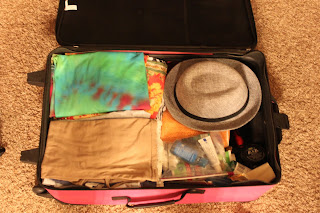“It’s bullshit on canvas, that’s what it is,” I say, hoping the noise of the subway drowns out the scene my friend and I are making.
“No way!” he responds. I’m not sure if he truly believes this or if he’s disagreeing with me for the sake of argument. Either way, I don’t mind.
“It totally is. Renaissance paintings, classical paintings… they need so much technique. They’re not just random brush strokes on a canvas—“
“RANDOM BRUSH STROKES?! Grishma, they’re expressing what the artist feels!”
“Who cares about what the artist feels? I'm the one who has to look at it!”
2 months ago, we were having a similar conversation, where I was arguing that it was all about expression, not interpretation and he was arguing the opposite. A few months prior, we were arguing the inverse.
We walk off the subway and begin our ascent to the street.
“I just don’t want people 1000 years from now looking back in time and thinking Pollock was the best we could do. We’ll be dubbed the double-dark ages or something,” I complain.
“Grishma, are you really letting the opinions of other art historians shape the way you view modern art?” he says, his eyebrow raised as it often is.
“No, I just agree with them. Realism is just… on a whole different level. It’s so brilliant.”
20 minutes of debate later, we enter the National Portrait Gallery. A short walk into a hallway, and we’re staring at a horrendous finger-painting of a man and a house. Made by a grown man, no less.
“See what I mean?” I say, drawing out my words so he knows I’m implying I was right all along.
“Okay, but there are realistic paintings that are boring!” he says, and our debate echoes down the hallway as we make our way past other paintings.
Then, we come face to face with the most realistic painting I’ve ever seen in my life. It’s a close up of a man’s face, and it looks like a photograph. Black and white. Acrylic on canvas. Both of us stop talking and stare. It is the most brilliant painting I’ve seen that was made after I was born.
About a half an hour later, we’re strolling through the National Gallery, looking at pieces by Monet, Van Gogh, Titian, in awe.
“This one,” he says, pointing to a portrait of some cardinal. “This one’s realistic but I wouldn’t want it in my living room.” It was a pretty boring painting, I admit. I’d much rather have modern art pieces in my house than the Ugly Cardinal Painting.
But, of course, I don’t admit concession when I debate with this particular friend. So, I say “You wouldn’t? Oh come on, you could talk to it every morning with a cup of tea… pretend the cardinal is right there with you…”
We laugh, immersing ourselves in all the different brilliant paintings this building houses. Hours later, we finally finish and head outside in search of a café. I’d been craving a mocha all day, and he was hungry.
We finally end up at Pret, a café just a block away from the Gallery. I sit down on a counter with my mocha and fruit bowl, he sits next to me with a pasta dish and sandwich. The rising steam from my coffee draws my eyes to the view in front of us.
“Where else can you have this view while you eat?” he says
“Only in London,” I say, taking a sip.
My cup is 80% full.
“And he brought out a book and showed me this equation, and he told me that it’s up for debate, that it’s just a theory. It threw me off… how could a human construct invented to make sense of the world (math) not make sense of something? I wish I could just be okay with not having any real answers…”
My cup is 60% full.
“First day of class—he just sat there. And he didn’t say anything for like the longest time. Then he says ‘I always like to start the class off with an awkward silence.’”
My cup is 40% full.
“Wait I really like this song. Let’s just listen.”
My cup is 30% full. I’m drinking a little more slowly now because I want to keep the conversation going.
“And I mean, I have this conversation with people a lot, I tell them what I think about art. What is art? Can anyone put it in words? I’m just trying to be okay with not knowing.”
My cup is 15% full.
“It’s so interesting that you one word can conjure up so many different things depending on who you say it to.”
My cup is 3% full.
“That was when I realized that I couldn’t relate to Indians the way I did when I was last here. And it took a lot to be okay with this… hybrid culture I was now a part of.”
The remaining coffee has dried at the bottom of my cup, but the conversation doesn't stop. Here, in front of a magnificent building, I enjoy great conversation with a great friend over great food. And, like any other day I would have had a heated conversation with him, we ended the day in lighthearted conversation and a walk.
Oh, but in London this time.
[Suggested further reading
here]











